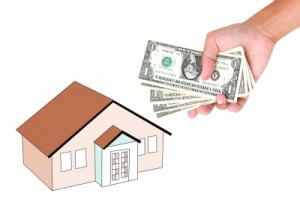
Nowhere to invest? With a sky-high stock market, it often seems like there’s nowhere to put money.
Image courtesy Renjith Krishnan via FreeDigitalPhotos.net.
I had an interesting exchange with a reader named Bradley recently. Bradley’s basic question was “with the market at all-time highs, where do you put your money? It’s a good question because it does feel a bit like there’s nowhere to invest right now.
And it’s a particularly relevant question for me because I’ve been facing this exact dilemma with the recent windfall from the sale of my fourplex. Making matters “worse,” I just sold another piece of property so I have even more cash coming my way.
If you’ve ever made the mistake of reading any news site comment sections related to the stock market, you already know that there are two main contingents who both believe they are 100 percent correct: One says the market is headed for a crash very soon and only a fool would gamble his money in the stock market. The other group, equally sure their beliefs are correct, say the market will keep going up, up, up and only a fool stays out of the market worrying about a crash. (To get a handle on your investment portfolio, be sure to sign up for a free account from Personal Capital.)
Naturally, both sides are right and both are wrong. In reality, we all know that this market will undergo a significant correction at some point. We also know that the market will grow its way out of that dip. What we don’t know, of course, is when and we don’t know how long it will take to recover. That’s why the most important factor in any investment is the investor’s personal situation. For example, this is why people nearing retirement are typically advised to move to safer holdings as they age, although ironically people in this situation currently are among those who feel strongest that there is nowhere to invest. For some perspective, consider that my first money market account back in the late ’90s paid five percent!
There was a pretty interesting piece in CNN Money in January. While generally sticking with fairly standard allocations and advice, the writer reminds us that good ol’ cash also used to be seen as an asset class.
I recommend heading over and reading the whole thing. Lots of interesting data points pulled together, such as the fact that the market usually has a 10 percent drop once a year but hasn’t seen one in 2 1/2 years (at the time the article was published). The writer suggests 10 years of disappointing returns await. And, oh yeah, the level of borrowed money in the market is already reaching pre-crash levels. So we’ve got a bubble again, inflated with Fed policy, borrowed money, greed and blind trust.
I might be the last honest blogger, because I’ll just tell you the truth: I have no idea what’s going to happen or when. I held my real estate winnings in cash at the end of last year, partly because I was expecting at least a small correction (which we’ve finally gotten a little taste of) and partly because I haven’t had time to really focus on it. (Which is not to say I didn’t do anything with my money last year. I actually was moving and reallocating funds quite a bit, which is still going on.)
So far this year, I have picked up a few individual stocks when I see a good value, but I’ve held off on buying much more in the way of mutual funds so far. And, in fact, I’ve been moving more money into cash, as I finally dump some stuff I’ve been packing around with higher costs. I’m dreading the tax impacts after this year, but I just want to clean up my portfolio.
My short-term strategy right now is to go ahead and sell my high-cost funds (I have seven of them left at this point with various amounts of money in them). Thus, my cash position is increasing. I’m selling those semi-quickly. Meanwhile I’ll be moving this cash back into individual stocks and/or low-cost Vanguard funds — however, this will happen much more slowly, basically dollar-cost averaging my way back in. By default, depending on how slowly I move these dollars back into the market, I’ll be effectively keeping significant assets in cash as well. I don’t want to say I’m hoping for a big market crash, but if one were to happen, this would be a pretty awesome time.
So that basic framework aside, let’s get back to the main question: what do you do when there’s nowhere to invest?
Let’s start by recognizing that, really, there is always somewhere to invest. Maybe with a sky-high market, now isn’t the time to move a large sum in all at once. But there are always a few undervalued stocks. But you have to be careful. It always rains after I wash my car and the market always dips when I make a purchase. And with the market so inflated, I have been thinking quite a bit about what options do exist outside the usual menu we typically think about. Here are a few things I’ve thought about.
Pay off debt
If you’re carrying any consumer debt at all, this is a good place to start. Whatever your interest rate is on the debt you’re carrying is your effective return by paying off that loan. Still carrying a car loan? Maybe instead of buying into an over-inflated stock market, you pay that car off for good. The free cash flow you now enjoy could dollar-cost average its way into the market or you could save it up so you’re ready to pounce when things drop.
Keep funds in cash
Why consider holding money in cash? Well, on one hand it’s a defensive move — you’re protected from a big crash. When everyone else is panicking, you’re kicking back on your pile of cash. That pile is, however, slowly disintegrating under you, however, as inflation eats away at your buying power. There is another advantage, of course. Imagine if you’d been sitting on big pile of cash during the real estate crash. I know if I didn’t have all my money tied up in, yes, real estate, I would have been on a shopping spree. Thus retaining cash can be an offensive move as well. Sit, wait for a big drop and start swinging your big weapon.
Pay off your house
If you don’t know where to put your money right now but you’re still carrying a mortgage, perhaps it’s a good time to increase your security by putting a bullet in your mortgage. If you’re worried about missing a big market dip, maybe open a HELOC on your now paid-off mortgage. If things look irresistible, you can pull out the funds from your house again and take advantage of market conditions. Remember the crash you’re waiting for could be two or three years away and you could be enjoying the cashflow improvement in the meantime.
Lower your overhead
Recently I wrote about forcing cashflow and how it can hurt you or benefit you. If you’ve got a sum of money and no place to put it, spending some of that money on increasing your cashflow situation can be a savvy move. For example, I’m still considering making the move on solar panels for our house (no-brainer if we’re going to stay in this house long-term). A $15,000 investment in solar would permanently remove our $75/month electricity bill. The downside is it doesn’t pay if we move. But the idea is the important part. For you, it could mean upgrading to a more efficient car, new insulation for your house, moving closer to work, buying new clothes that don’t need dry cleaning. You name it.
Increase your security
You could also tap your funds for increasing your financial security as well. This might mean stepping up and paying for a few things now just so you don’t have to bother with it later. Maybe your roof is starting to fail — writing that check now while you have the cash not only removes a hassle from your list, but think about the alternative: Imagine you bought in big to the market at the top and suddenly find yourself with several years of waiting before you’re out of your hole. Then, while you’re waiting, the roof fails completely, leaving you in desperate need for cash. By making sure these aspects of your life are rock-solid now while you have this free cash, you’ll be in a much more solid position when crash time comes.
Be creative
People forget there are other places to invest outside the stock market. There are too many to list here, but for example a guy I used to work with owned shares in a local pizza place. There are always people looking for private investors — some people have friends or family who are interested in starting business for example. (Be careful!) You could even buy a small business if desired. Always wanted to own your own restaurant? Now is your chance! If you can think of it, you could probably make it happen. Have a great idea for a mobile app? You could probably hire a development team overseas for less than $20,000 and bring your idea to reality. In addition, there are online lending options such as Lending Club or Prosper
where you can make a decent rate on your invested funds.
Jump in anyway
And, of course, where most of us will end up is back in the market, hoping any dip is not too deep or long-lasting. This is where I’ll probably end up as well. I’ll dollar-cost average my way in, at least, but more than likely I’ll limp my way back in and just wait out any dips, just like I always do. In the end, prudent, boring investing in low-cost index dividend funds is usually the best bet. But when you have a big chunk of cash you’re sitting on, it’d sure be nice to start out with a lower price.
What do you think? Any other creative places to put money while the market remains so high? What would you do if you had a large sum that needed a home?




